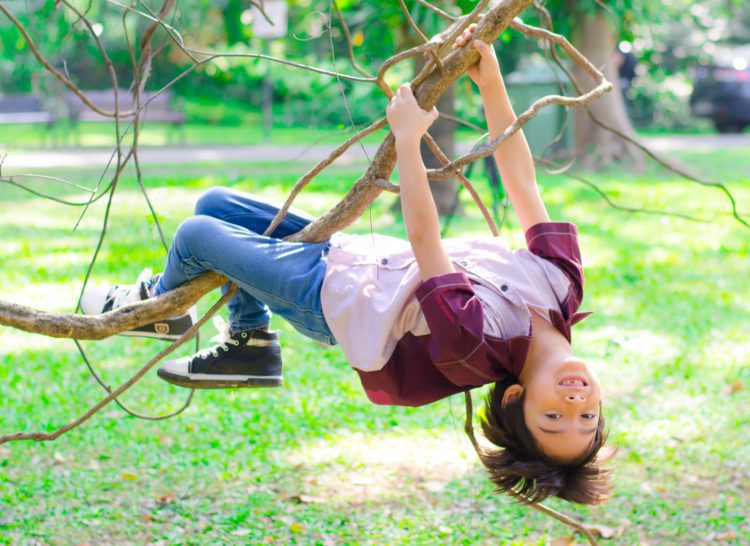Building Resilience, Essential Kids Blog, Maggie in the Media, Play & Nature Play, Posts for Parents, Press & Online
Are we about to ban childhood altogether?

As a passionate advocate for allowing children a childhood that allows them to play as often as possible outside — doing the healthy activities that enable children to grow and thrive — I almost choked on my breakfast when I read of the recent ban on cartwheels at a Sunshine Coast state school.
The way our nanny state thinking is going, soon our children will be cautioned when walking or maybe even breathing. This fear-based thinking is creating a culture that disables our children to learn how to stretch and grow, challenge themselves, overcome mild discomfort and deal with childhood unpleasantness.
The avoidance of anything that may involve risk ignores the benefits of having risk in our children’s lives.
We do not learn emotional buoyancy and resilience by avoiding the normal minor adversities of playing with other children, we learn by embracing these things with the guidance of sensible, realistic adults. And I am not talking here about “trained PE teachers” supervising their lunchtime moves.
The department response is equally worrying:
“A department spokesman said the ban was to prevent, and not in response to, playground injuries.”
So to prevent playground injuries we notion that we need to prevent movement that is considered by play specialists and health professionals (backed by truckloads of research) to be beneficial and helpful because it is considered normal. This is mystifying and ridiculous.
Normal childhood movement that helps children grow healthy physically, cognitively, emotionally and socially includes running, chasing each other, doing random things like handstands and cartwheels. It is called free play.
This free play is also what builds psychological strengths that help our children throughout life.
These vital developments cannot happen solely through being passive or through direct verbal interaction with adults and technology.
There are so many factors that are eroding children’s opportunities to play in our modern world and so many busy parents tell me they simply struggle to make the time for such opportunities – especially time outside in nature.
So when schools can support the need for physical play, we should be celebrating it and not shaming it and shutting it down out of the irrational fear of what might happen!
One of the world’s leading experts on play, psychologist and researcher Dr Peter Gray – author of the great book, Free to Learn – sees an even more serious consequence of us going along this pathway to stop play in childhood.
“Over the same decades that children’s play has been declining, childhood mental disorders have been increasing. In my book, Free to Learn (2013), I document these changes, and argue that the rise in mental disorders among children is largely the result of the decline in children’s freedom.” — Dr Peter Gray, Aeon magazine.
It is the fear of the angst of a few parents who may hold a school accountable for the normal bumps and bruises of childhood, that sees all the children penalised.
Accidents actually happen in life and we need to help today’s children learn that sometimes an accident can happen without there being a need to blame.
I have seen a child want to blame a hose which they fell over. Rather than ban hoses, we need to teach our children to watch where they put their feet.
Also, sometimes even when we are taking care, we can make an error of judgement and hurt ourselves or someone else. That’s life.
Rather than attack the principal of this school, who is trying to do the right thing, we need to have school-based conversations with staff, parents and students about what the value of having a playful culture which allows for adventuresome play with an element of risk.
Children can learn to manage risk and UK researcher Tim Gill’s work shows that more children are hurt in today’s modern, supposedly safe playgrounds than the old dangerous ones.
“Activities and experiences that previous generations enjoyed without a second thought have been labelled as troubling or dangerous, while adults who still permit them are branded as irresponsible… society appears to have become unable to cope with any adverse outcomes whatsoever, no matter how trivial or improbable.” — Tim Gill, No Fear: Growing up in a Risk Averse Society (2007).
Let’s celebrate the odd bumps and bruises as a sign of healthy growth and development or else we may see fear-based thinking steal childhood altogether.
Image credit: ©️ wckiw /Adobe Stock – stock.adobe.com



